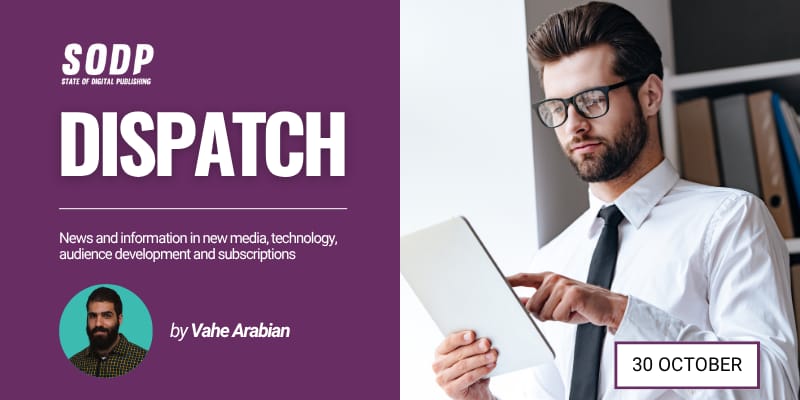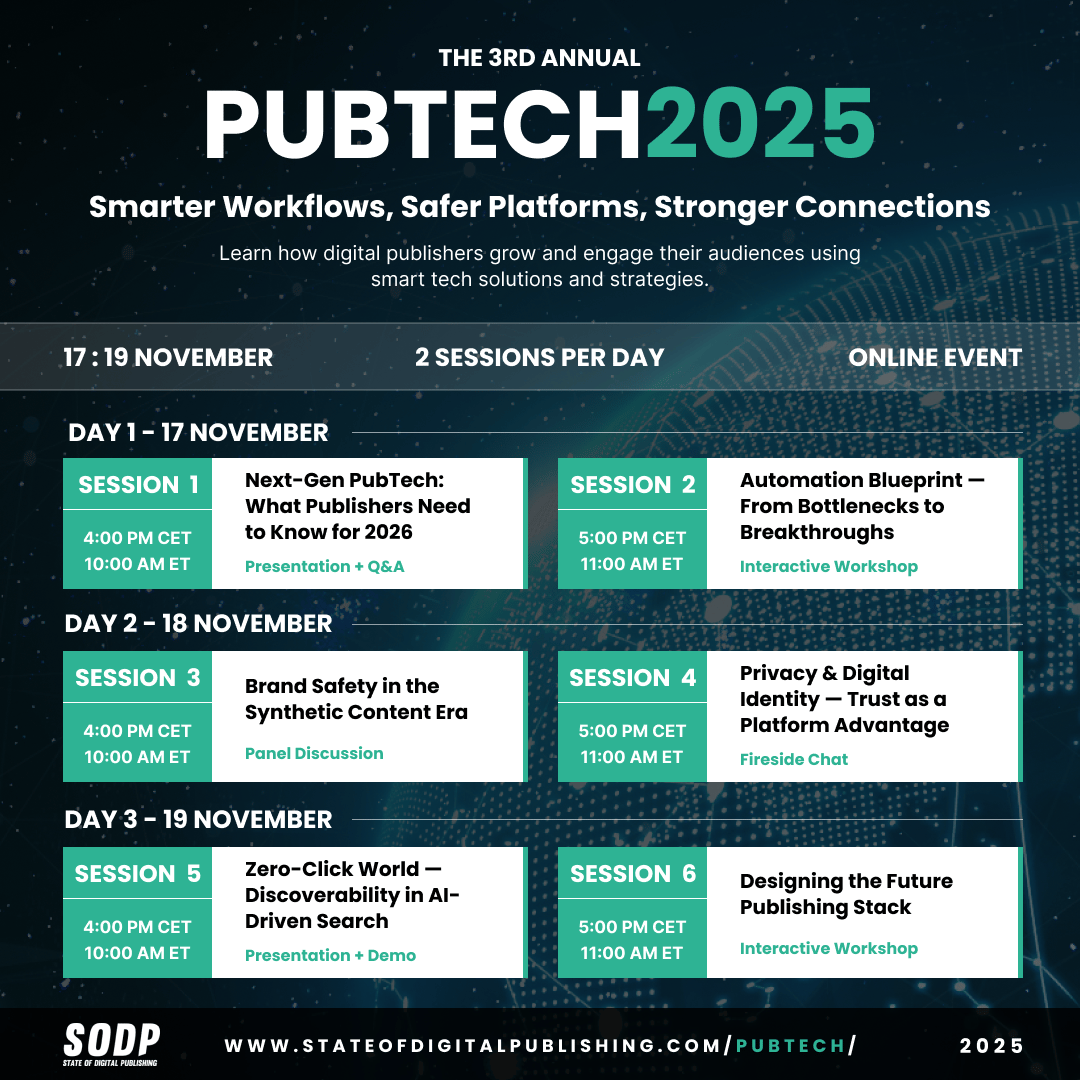- SODP Dispatch
- Posts
- SODP Dispatch - 30 October 2025
SODP Dispatch - 30 October 2025
World Online Networking Day reminder: genuine professional relationships start with simple actions, media's product revolution, AlphaMetricx review, AI assistants fail accuracy test + more

Hello, SODP readers!
Welcome to all our new members joining the community this week.
In today’s issue:
From SODP: AlphaMetricx Review: Beyond Vanity Metrics
Resources & Events: PubTech 2025: Smarter Workflows, Safer Platforms, Stronger Connections + PubTech Dinner London 2025 + SODP California Dinner Event
Tip of the week: Most online opportunities begin with a simple comment or message
News: AI assistants fail accuracy test in 45% of news responses, publishers accelerate bundled subscription strategies, Wikipedia traffic drops as AI Overviews rise + more
FROM STATE OF DIGITAL PUBLISHING
AlphaMetricx Review: Beyond Vanity Metrics
By Sreemoyee Bhattacharya
Most PR teams operate on guesswork disguised as reporting. They track mentions, sentiment scores, share of voice—but can't explain why those numbers moved or what action to take next.
This creates a predictable pattern: React after damage is done, miss emerging opportunities, duplicate competitor strategies without understanding why they worked.
AlphaMetricx attempts to solve this by combining real-time monitoring with AI-driven causation analysis. Instead of just flagging a 60% sentiment drop, it surfaces the specific review or event that triggered it. Instead of showing competitor SOV, it reveals which narratives are actually driving their coverage.
Key differentiators from traditional monitoring:
PR Impact Score weights mentions by actual influence, not volume
Message Congruence validates whether your communication lands as intended
Unlimited customizable dashboards for different teams/objectives
Automated newsletters eliminate manual report assembly
The platform isn't positioned as a lightweight tool. It requires analyst support for setup, uses custom pricing based on scope, and assumes teams need depth over simplicity. Built for organizations where media intelligence directly impacts strategy, not just PR vanity reports.
Our full review breaks down the technical capabilities, onboarding process, dashboard architecture, and automation features.
RESOURCES & EVENTS
🎯 PubTech 2025: Smarter Workflows, Safer Platforms, Stronger Connections
17-19 November 2025 | 4 PM & 5 PM CET | 10 AM & 11 AM ET | Online Event
AI is moving from experimentation to becoming embedded in news operations. Meanwhile, misinformation, deepfakes, and unsafe ad placements have pushed brand safety to boardroom priority, while zero-click environments make it harder to control content discovery. Over three days, industry leaders and technologists will gather for targeted sessions and practical workshops. Topics include Next-Gen PubTech trends for 2026 with IBM's Anabelle Nicoud, automation blueprint workshops, brand safety in synthetic content, privacy and digital identity strategies, zero-click world optimization, and designing future publishing stacks with Stanford's Eric Ulken. The event features 10+ panelists and expects 300+ digital publishing professionals from around the world.
💂 PubTech Dinner London 2025
Monday, November 17, 2025 | 6:00 PM GMT | Cornus Restaurant, London
We're bringing together senior publishing leaders for an intimate dinner on product, design, and AI innovation. Mel McVeigh, who led transformation at Condé Nast and now advises global media organizations, will share how publishers can unite product and design teams to build scalable transformation roadmaps. This is a high-trust, off-the-record conversation—no pitches, no slides, just honest discussion about what's working and what's not. The format is simple: dinner, drinks, and the kind of strategic conversations that don't happen in public forums.
🍽️ SODP California Dinner Event 2025
Thursday, November 13, 2025 - 6 PM | Rustic Canyon Restaurant, Santa Monica
Join senior media publishing leaders and executives for an in-depth conversation on audience monetization and growth playbooks. Share your biggest challenge, participate in facilitated group conversations with executive-level professionals, and obtain strategic insights not publicly available. The dinner is high-trust, collaborative, and off-the-record, focused on sharing what's working and what's not across markets. Invite includes dinner, drinks, and post-evening discussions. Seats are limited.
BITE-SIZED ADVICE
By Vahe Arabian
📧 Most online opportunities begin with a simple comment or message.
World Online Networking Day on 30 October is a timely reminder that genuine professional relationships are built through small, proactive actions. A short invite for a virtual or in-person coffee can lead to advice, shared challenges, and often a new direction you never expected.
My own career has been shaped this way. From my early publishing experience in 2010 to stepping into SEO roles where I was often the first hire, many of those opportunities started with conversations sparked through curiosity and initiative. Those coffee catchups gave me a chance to highlight business and technical solutions others may not have seen on their sites. Even when timing was off, those relationships often evolved into collaborations later.
Networking is not about volume. It is about intent. Digital publishing industry is driven by problem-solving, and the most meaningful professional connections form when you show a genuine willingness to help someone solve a problem that matters to them.
Practical guidance for building genuine online connections
✅ Use your outreach to ask for advice, not a sale
✅ Prepare one high-impact idea tailored to their brand or challenge
✅ Follow up with a clear recap and how you can support without pressure
✅ Stay visible with useful insights or comments aligned to your expertise
✅ Keep relationships active even when there is no immediate commercial fit
Here are the key takeaways
1. Curiosity builds trust
2. Preparedness shows value
3. Relationships compound over time
Your next conversation could shape your career. Reach out to someone you admire and propose a short coffee chat. Share one actionable idea that demonstrates your thinking. Opportunity often arrives quietly.
WHAT WE ARE READING
AI assistants make widespread errors about news, new research shows | Reuters
Leading AI assistants misrepresent news content in nearly half their responses, according to new research from the European Broadcasting Union and BBC. The study analyzed 3,000 responses from ChatGPT, Copilot, Gemini, and Perplexity across 14 languages, finding 45% contained at least one significant issue. A third of responses showed missing, misleading, or incorrect attribution, with Gemini showing the highest rate at 72%. Examples included ChatGPT reporting Pope Francis as current Pope months after his death. With 7% of online news consumers now using AI assistants for news—15% of those under 25—EBU warns public trust could be undermined.
Publishers roll out bundle initiatives to boost digital subscriptions | WAN-IFRA
News publishers are accelerating bundled subscription strategies with several major announcements in recent weeks. The Boston Globe combined its new Boston.com paywall with Boston Magazine access. News Corp Australia bundled The Australian, Wall Street Journal, and The Times of London for one price. Bloomberg Media and Sports Business Journal launched an offer for new subscribers: a year of Bloomberg.com plus six months of SBJ for $299. The New York Times has been particularly active, with subscribers to El País, Politiken, The Irish Times and Corriere della Sera receiving NYT bundle access.
AI is breaking the economics of content | Search Engine Journal
Wikipedia's human traffic declined 5% year-over-year while Google referrals dropped 35% as AI Overviews make clickthroughs redundant. Nearly 50% of Wikipedia's queries now display large AI Overviews at the top of results. The shift reveals AI rewards "additive content" (net-new insights) over "evergreen content" (timeless topics). YouTube's citation rate jumped from 37% to 54% while Wikipedia dropped from 58% to 42%. Sites offering additive UGC—Reddit, LinkedIn, YouTube, Quora—gained LLM visibility, while evergreen sites like Stack Overflow and Chegg lost significant organic traffic. The analysis suggests shifting content investment from 80/20 evergreen/additive toward 50/50 or 70/30.
News creators dominate in some markets but not others, 24-country study finds | Reuters Institute
News creators and influencers are reshaping media consumption, but their impact varies dramatically by country, according to a comprehensive study covering 24 nations. Creators are especially influential in Brazil, Mexico, Indonesia, Thailand, Nigeria, Kenya, South Africa and the United States, but play smaller roles in Japan and most European countries. Among Under-35s using social media, 48% consume news from creators versus older demographics favoring mainstream brands. However, 85% of top 15 creators across 24 countries are men. YouTube is the most important platform for news creators, with platform preferences varying by region.
The next media revolution isn't editorial—it's product | Digital Content Next
Publishers are shifting from channel distribution to product strategy, creating experiences audiences trust and invest in. Media teams now apply product thinking with clear questions: Is there a real problem? What does success look like? Does a market exist? Propensity modeling helps identify early engagement signals, studying data patterns to understand not just what audiences say they want but what they actually do. Every interaction—newsletters, video, social participation—offers clues about how people move through the experience. The shift reinforces that product work is about designing systems that anticipate needs, remove friction, and deepen value with every interaction.


